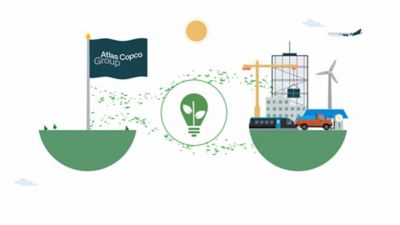Sustainability A hot topic at the annual stakeholder dialogue
July 10, 2015
As a big global company, Atlas Copco faces a host of business-relevant sustainability challenges on a daily basis. How do we do business ethically in markets where bribes are commonplace? What is the business case for innovating safer products? What should we do if our suppliers have poor labor conditions? To discuss these and many more sustainability issues, Atlas Copco on May 11, 2015, hosted its fifth Annual Stakeholder Meeting.
Karin Holmquist
Sustainability isn’t part of our business, it is our business – and it is part of your life.
What role do Atlas Copco’s internal audits play for sustainability?
“Internal audits verify risk controls and governance towards The Way We Do Things in Atlas Copco companies. Sustainability is an integrated part in the audits, same as in Group goals and the operational processes. It will lead to good governance, efficiency, long-term productivity and profitability.” - Karin Holmquist, Vice President Group Internal Audit and Assurance, Atlas Copco.
What role do Atlas Copco’s internal audits play for sustainability?
[caption id="attachment_2189" align="alignnone" width="800"] Karin Holmquist[/caption]
“Internal audits verify risk controls and governance towards The Way We Do Things in Atlas Copco companies. Sustainability is an integrated part in the audits, same as in Group goals and the operational processes. It will lead to good governance, efficiency, long-term productivity and profitability.” - Karin Holmquist, Vice President Group Internal Audit and Assurance, Atlas Copco
How is sustainability important from a legal perspective?
[caption id="attachment_2188" align="alignnone" width="800"] Jack Henchel[/caption]
“All of us, Atlas Copco included, are custodians of the Earth’s natural resources. Our global corporate footprint should sustain the green environment, fresh air and clean water we all want for our children and their children. Indeed, Atlas Copco makes the sustainable productivity of our customers a committed priority. Many nations have laws that protect the land, air and water. Atlas Copco works hard to comply with our legal obligations through our own comprehensive due diligence and risk management processes.” - Jack Henschel, Vice President and General Counsel, Atlas Copco Group Compliance
Karin, you deal with investors daily. How into sustainability are they really?
[caption id="attachment_2187" align="alignnone" width="800"] Karin von Marten[/caption]
”Today unfortunately it’s not very integrated on the investor side, but I’m optimistic. Most traditional portfolio managers are focusing very much on financial questions in our meetings. And in the same institutions they may have other teams going through our sustainability approach. But it’s increasingly getting more important also for the traditional portfolio managers, and from Atlas Copco’s point of view we are aiming to meet both with traditional investors and with the more sustainability-minded investors.” - Karin von Matern, Investor Relations Officer, Atlas Copco
How do you as an investor view sustainability?
[caption id="attachment_2186" align="alignnone" width="800"] Anette P Andersson[/caption]
”Sustainability is extremely important. It’s cost reduction, it’s efficient use of resources, and it’s business opportunities. Since we are such a large owner on the Swedish stock market, and a long-term investor, it’s very important for us to understand how a company like Atlas Copco drives the business forward and takes advantage of these business opportunities. We feel the pressure from our clients to take this into account in a more structured way than it has been in the past. We’re becoming more sophisticated in how we do our investments.” - Anette Andersson, Portfolio Manager and ESG Investment Specialist, SEB
Jack Henchel
Karin Larsson
Anette P Andersson




